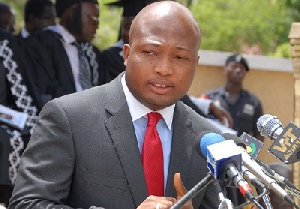- Home - News
- TWI News | TV
- Polls
- Year In Review
- News Archive
- Crime & Punishment
- Politics
- Regional
- Editorial
- Health
- Ghanaians Abroad
- Tabloid
- Africa
- Religion
- Election 2020
- Coronavirus
- News Videos | TV
- Photo Archives
- News Headlines
- Press Release
General News of Friday, 23 September 2016
Source: www.ghanaweb.com
The youth can play a decisive role in promoting change – Ablakwa
The deputy Minister of Education, Samuel Okudzeto Ablakwa says the youth in Ghana have the potential of playing a decisive role in promoting change.
He said this last Tuesday at the launch of the Youth of Ghana program in Accra to encourage the youth to take active part in national development at the Accra Academy, Accra.
The program dubbed: “The youth of Ghana: the future we want to build for ourselves,” is an all-inclusive initiative to get the children and youth of Ghana on board- the-process towards the development of a Long-Term National Development Plan, was organized by the National Development Planning Commission (NDPC) in collaboration with the Ministry of Education and other stakeholders.
Mr Okudzeto Ablakwa said the youth constitute a high proportion of the population, and represent an exciting opportunity for investment in development and are specially endowed with energy and enthusiasm, ideas and creativity, endless curiosity and the drive to discover.
“The platform had been created to afford children and the youth an adequate role to effectively participate in the development processes and ensure that their aspirations and desires are heard, documented and used to inform the development processes of our Long-Term National Development Plan (LTNDP)”, Okudzeto Ablakwa added.
The Youth Program is targeting children and youth in basic, secondary and tertiary schools across the country, as well as those who are out-of-school. The strategy is to engage the youth in a continuous fashion and stimulate them to engage members of their families and communities in contributing ideas to the long-term plan.
The youth-focused consultations will commence with a media launch to reach the wider population, and continue with efforts to obtain specific information on the needs and concerns of children and youth and how to address them in a coherent and consistent fashion. It is also to inform the youth about their role in the development process in general and the expectations for their participation in the plan preparation process, through a number of activities.
Dream Ghana Week is a segment of the youth program for basic and second-cycle schools to be observed from 26 September-2 October, 2016. The segment aims at raising awareness among the youth of their vital role in shaping their own future in their communities and the country. It is an opportunity for them not only to articulate the big dreams they have for themselves but also to generate discussion about how they will go about realizing those dreams. The aim is to help the children and youth (aged 5-35 years), who constitute about 60 per cent of the population, become fully aware that their future is theirs to determine.
A National Essay/Drawing Competition open to children and youth (aged 5-35 years) for six weeks from 20 September to 3 October 2016. Submissions from across the country will be assessed by a panel, and the top 10 entries will receive various forms of recognition and awards.
A Series of National Debates organized under the auspices of the Ghana Education Service at district, regional and national levels. The winners of the regional debates will receive citations and the finalists at regional level will meet for a national debate. A parallel competition will be organized for tertiary and out-of-school youth.
A National Youth Forum that brings together youth groups and organizations as well as the winners of various events in the national youth program. They will share knowledge and experience from the plan preparation process and take part in the award ceremony.
The youth consultations will be an on-going process covering the remaining stages of the plan preparation period, the drafting and validation of the Plan, and its dissemination. At the end of the program, it is expected that the youth would have been engaged in the process and made vibrant contributions to the preparation of the long-term national development plan. Their involvement in the process will make them own the Plan, and its successful implementation will depend on them since they will be the adults of Ghana during the plan period.











